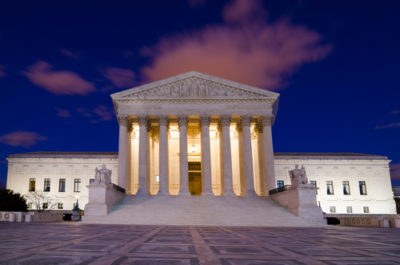A pair of decisions from the U.S. Supreme Court on July 8 handed a win to employers that desire to rely on religious convictions in their employment decisions.
One ruling affirms the “ministerial exception,” and the other allows private employers with moral or religious objections to birth control to legally exclude such coverage in their employer-sponsored health plans, even though coverage of contraception is mandated by the Affordable Care Act (ACA).
Burton J. Fishman, an attorney with Fortney & Scott, LLC, in Washington, D.C., says it’s appropriate to view the two decisions together and consider how they may affect future challenges to the Court’s recent decision prohibiting discrimination based on sexual orientation and gender identity.
On June 15, the Court ruled in Bostock v. Clayton County that the language of Title VII of the Civil Rights Act of 1964, which covers employers with at least 15 employees, is broad enough to prohibit discrimination based on sexual orientation and gender identity.
The July 8 decisions taken together, along with the Court’s recent decision dealing with public funding of religious schools, “will encourage interested parties to seek ways to challenge Bostock on religious grounds—as virtually invited by Justice Gorsuch,” Fishman says.
Justice Neil Gorsuch wrote the majority opinion in Bostock. The concluding paragraphs of the opinion note that employers in future cases may raise free-exercise-of-religion arguments “that merit careful consideration,” but none of the employers in the cases heard as part of the Bostock decision showed that compliance with Title VII infringed on their religious liberties.
Fishman calls the July 8 decisions “progeny of Hobby Lobby.” The 2014 Burwell v. Hobby Lobby decision was significant in that it “treated private institutions as having religious and moral rights,” he says, adding the new decisions “will encourage interested parties to seek ways to challenge Bostock on religious grounds.”
Ministerial Exception
The Court’s 7-2 decision in Our Lady of Guadalupe School v. Agnes Morrissey-Berru and St. James School v. Biel affirms the “ministerial exception,” a doctrine related to the First Amendment that prevents government interference in religious organizations’ ability to hire and fire employees. Justices Ruth Bader Ginsburg and Sonia Sotomayor dissented.
“The religious education and formation of students is the very reason for the existence of most private religious schools, and therefore the selection and supervision of the teachers upon whom the schools rely to do this work lie at the core of their mission,” Justice Samuel A. Alito Jr. wrote in the majority opinion.
Fishman says the ruling “is important in that it continues the expansion of institutional religious ‘rights’ to deny statutory protections to individuals, here employees of religious schools.” In both cases, teachers at religious schools claimed discrimination—one claimed age discrimination and the other disability discrimination.
Just how closely aligned to religion an employer must be to qualify for the ministerial exception is unclear, Fishman says.
“It appears that a teacher at a religious institution with any duties arguably characterized as ‘religious’ is now covered by the exception,” Fishman says. “No ordination or title is required; lay teachers with no particular religious training were involved here.”
The decision means that institutions “have a much freer hand now to use ‘religion’ as a reason for employment decisions without a great deal to be concerned about from the courts.”
Sarah E. Stula, an attorney with Foulston Siefkin LLP in Overland Park, Kansas, says the ruling “broadens the scope of the ministerial exception to include teachers at religious schools who do not have the title of ‘minister’ or formal religious training.” She says if an employee of a religious institution educates young people about their faith, the employee likely qualifies for the ministerial exception.
As for advice for employers that may want to invoke the ministerial exception, Stula says they should have job descriptions and policies in place “that clearly state the institution’s religious mission, that employees are expected to help carry out the mission, and that employees will be evaluated for their efforts to carry out the mission.” In addition, job descriptions should reference the employee’s religious duties and the requirement to abide by the applicable religious code of conduct.
Steven L. Brenneman, an attorney with Fox, Swibel, Levin & Carroll, LLP, in Chicago, says the ruling is significant because “it confirms an expansive view of the ministerial exception under antidiscrimination laws.”
“The key factor that determines whether the exception applies is whether the worker performs religious duties,” Brenneman says. “Therefore, custodians and bus drivers are not likely to fall within the exception, while teachers—at least those whose duties include teaching students about faith—are likely to be covered.”
Objections to Contraception
The Court’s 7-2 decision in Little Sisters of the Poor Saints Peter and Paul Home v. Pennsylvania means private employers with moral or religious objections to birth control can legally refuse to provide contraception as a benefit in their health plans, despite a mandate in the ACA’s regulations.
The ACA already provided an exemption for churches and synagogues, and an opt-out provision was available for certain other religiously affiliated institutions that allowed them to shift the burden of contraception coverage so that it wasn’t included it in the employer’s plan.
Fishman says Little Sisters of the Poor was widely anticipated, and it gives “sweeping” authority to the U.S. Department of Health and Human Services to interpret the statute, including permitting religious and moral objectors to contraception to withhold those health services from their employees.
“Some believe well over 100,000 employees could potentially lose these services,” Fishman says. “It is hard to know who the Court will bar from exercising this ‘right,’ and that remains a serious problem.”
Tammy Binford writes and edits news alerts and newsletter articles on labor and employment law topics for BLR web and print publications.
The post Supreme Court Rulings Boost Employer Decisions Based on Religion appeared first on HR Daily Advisor.
